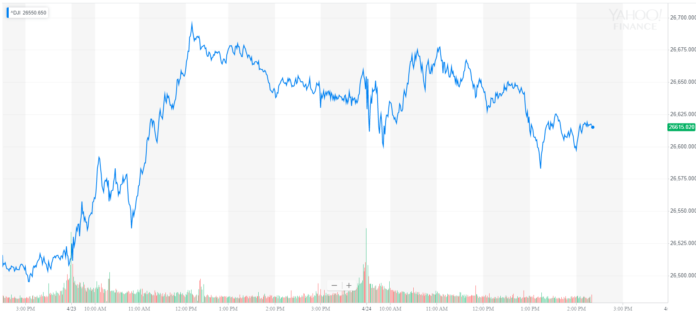[ad_1]
By CCN: The Dow and broader U.S. stock market drifted lower Wednesday, pressured by a sharp decline in energy shares after government data showed a surprise build-up in commercial crude inventories.
Dow Slides; S&P 500, Nasdaq Follow
All of Wall Street’s major indexes traded in negative territory, mirroring a skittish start to the day for Dow futures. The Dow Jones Industrial Average was off by as much as 84 points. It would later pare losses to settle down 42 points, or 0.2%, at 26,614.16.
Energy blue-chips weigh on Dow. | Chart via Yahoo Finance.
Chevron Corp (CVX) and Exxon Mobil Corp (XOM) were among the biggest losers.
The broad S&P 500 Index of large-cap stocks pulled back from record highs, falling 0.1% to 2,931.16. Energy stocks fell 1.4% on average.
The technology-focused Nasdaq Composite Index, which also hit a record high on Tuesday, drifted slightly lower to 8,118.40.
Also read S&P 500, Nasdaq Hit All-Time Highs as Twitter Records Sixth Straight Profitable Quarter.
Crude Inventories Surge, Stifling Energy Stocks

Could the end of Iran waivers influence Saudi Arabia’s adherence to the OPEC+ deal? | Source: Shutterstock.
Oil prices declined on Wednesday after the U.S. Energy Information Administration (EIA) reported a much bigger than expected rise in commercial crude inventories, raising some alarm over domestic demand. Crude stockpiles increased by more than 5.5 million barrels in the week ended April 19, nearly five times higher than what analysts were expecting EIA data showed.
U.S. West Texas Intermediate (WTI) futures fell below $66 a barrel following the report.
Earlier this week, the Trump administration confirmed that it will let waivers on Iran crude purchases expire next month as part of a wider ploy to pressure Tehran. The move surprised buyers of Iranian crude, who had received prior assurance from the State Department that the waivers would be renewed.
In the meantime, Saudi Arabia and the United Arab Emirates (UAE) are expected to meet the shortfall of Iranian crude, though the Saudis have been much more measured in their response to higher production quotas. This is likely due to Riyadh wanting to maintain a delicate balance between pressuring their arch-rival to the east and adhering to the OPEC+ deal. Basically, Saudi Arabia could kill the deal if it produces more than the quota it agreed to in December.
Click here for a real-time Dow Jones Industrial Average price chart.
[ad_2]
Source link
